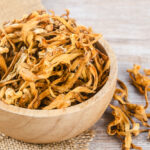Nature’s brain boosters: Discover how THESE 3 mushrooms can keep your brain sharp
 (NaturalHealth365) Hearty meat-like mushrooms provide a savory flavor to enhance any protein or vegetable dish. They are also an excellent source of nutrients that show promise in treating dementia, and other neurodegenerative diseases.
(NaturalHealth365) Hearty meat-like mushrooms provide a savory flavor to enhance any protein or vegetable dish. They are also an excellent source of nutrients that show promise in treating dementia, and other neurodegenerative diseases.
With 14,000 species of mushrooms, over 2,000 species are edible and used for medicinal purposes. Currently, 270 species are considered potentially therapeutic. However, research has proven a few species to be very beneficial for improving brain function.
Prevent memory loss with Cordyceps
Cordyceps is considered to be a medicinal mushroom in classical Asian pharmacology, as well as traditional Chinese and Tibetan medicines. The Pharmaceutical Society of Japan’s Biological and Pharmaceutical Bulletin recently reported the mushroom to be valuable for protection against Alzheimer’s as it prevents neuronal cell death and memory loss through its antioxidant and anti-inflammatory effects.
Other studies proved that Cordyceps is non-toxic and promotes cognitive health.
Cordyceps can be consumed in various ways. Whole, dried Cordyceps can be found in many natural health food stores and used in soups, stews, and stir-fry dishes. Powdered Cordyceps can also be used to make a hot tea beverage.
Stimulate nerve growth and improve cognitive impairment with Lion’s Mane mushroom
The Lion’s Mane mushroom is a rare edible used for culinary and medicinal purposes. For example, China and Japan have used it for hundreds of years as a tonic for the nerves and nervous system.
Recent medical research has confirmed the traditional usage of Lion’s Mane. In fact, clinical studies have demonstrated its positive effect on mild cognitive impairment. According to the International Journal of Medicinal Mushrooms, Lion’s Mane is the only mushroom to date that was found to have any stimulatory effect on the nerve growth factor. In 2014, the Chinese Journal of Integrative Medicine demonstrated Lion’s Mane’s capability of activating nerve regeneration after injury.
The medicinal benefits of Lion’s Mane are easily attainable. Besides supplementation, the mushrooms are edible and can be used with most entrees.
Oh, yes, in case you’re wondering: Its flavor is somewhat like shrimp or lobster.
Enhance learning memory and brain function with Reishi
Having a history dating back to over 4,000 years, Reishi mushrooms are considered to be a superior herbal remedy. Asian culture considered it to be “the mushroom of immortality,” while Romans called it “the food of gods.”
While it was used for general health, it also improved cognitive abilities and increased longevity. The Journal of Traditional and Complimentary Medicine confirmed this in 2013.
Enhancement of learning memory and cognitive function was also found in clinical studies which were reported in the Preventive Nutrition and Food Science journal. Though bitter, Reishi mushrooms can be eaten raw or cooked. Dried and powdered forms of the mushroom are used to make tea in traditional and alternative Chinese medicine.
Of course, scientists continue to research selected mushrooms for beneficial neurotrophic properties. But, this much we know, certain mushrooms such as Cordyceps, Lion’s Mane, and Reishi have proven preventative and therapeutic benefits.
And while no major side effects have been reported with these mushrooms, certain mushrooms may cause a negative synergistic effect with prescription medications. So, keep in mind people with specific health conditions should consult with a qualified medical professional before using these mushrooms – especially if you’re taking any prescription drugs.
To learn more about how to improve brain function and avoid dementia … own the Alzheimer’s and Dementia Summit, created by Jonathan Landsman.
Sources for this article include:
NIH.gov
NIH.gov
NIH.gov
NIH.gov
Jstate.jst.go.jp
Dl.begellhouse.com
Link.springer.com
Onlinelibrary.wiley.com
NIH.gov



